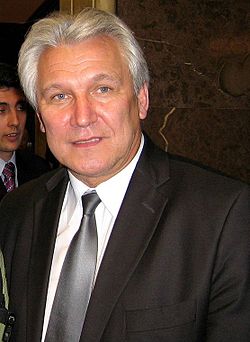Henryk Kasperczak
 Kasperczak in 2012 | ||||||||||||||||||||||||||||||||||||||
| Personal information | ||||||||||||||||||||||||||||||||||||||
|---|---|---|---|---|---|---|---|---|---|---|---|---|---|---|---|---|---|---|---|---|---|---|---|---|---|---|---|---|---|---|---|---|---|---|---|---|---|---|
| Full name | Henryk Wojciech Kasperczak | |||||||||||||||||||||||||||||||||||||
| Date of birth | 10 July 1946 | |||||||||||||||||||||||||||||||||||||
| Place of birth | Zabrze, Poland | |||||||||||||||||||||||||||||||||||||
| Height | 1.80 m (5 ft 11 in) | |||||||||||||||||||||||||||||||||||||
| Position(s) | Midfielder | |||||||||||||||||||||||||||||||||||||
| Senior career* | ||||||||||||||||||||||||||||||||||||||
| Years | Team | Apps | (Gls) | |||||||||||||||||||||||||||||||||||
| 1959–1965 | Stal Zabrze | |||||||||||||||||||||||||||||||||||||
| 1965–1966 | Stal Mielec | 0 | (0) | |||||||||||||||||||||||||||||||||||
| 1966–1968 |
Legia Warszawa | 0 | (0) | |||||||||||||||||||||||||||||||||||
| 1968–1978 | Stal Mielec | 209 | (37) | |||||||||||||||||||||||||||||||||||
| 1978–1979 | Metz | 55 | (11) | |||||||||||||||||||||||||||||||||||
| International career | ||||||||||||||||||||||||||||||||||||||
| 1973–1978 | Poland | 61 | (5) | |||||||||||||||||||||||||||||||||||
| Managerial career | ||||||||||||||||||||||||||||||||||||||
| 1979–1984 | Metz | |||||||||||||||||||||||||||||||||||||
| 1984–1987 | Saint-Étienne | |||||||||||||||||||||||||||||||||||||
| 1987–1988 |
Strasbourg | |||||||||||||||||||||||||||||||||||||
| 1989–1990 |
Racing Club de Paris | |||||||||||||||||||||||||||||||||||||
| 1990–1992 | Montpellier | |||||||||||||||||||||||||||||||||||||
| 1993 | Lille | |||||||||||||||||||||||||||||||||||||
| 1993–1994 | Ivory Coast | |||||||||||||||||||||||||||||||||||||
| 1994–1998 | Tunisia | |||||||||||||||||||||||||||||||||||||
| 1998 | Bastia | |||||||||||||||||||||||||||||||||||||
| 1999–2000 |
Al Wasl | |||||||||||||||||||||||||||||||||||||
| 2000 | Morocco | |||||||||||||||||||||||||||||||||||||
| 2000–2001 |
Shenyang Haishi | |||||||||||||||||||||||||||||||||||||
| 2001–2002 | Mali | |||||||||||||||||||||||||||||||||||||
| 2002–2004 | Wisła Kraków | |||||||||||||||||||||||||||||||||||||
| 2006–2008 | Senegal | |||||||||||||||||||||||||||||||||||||
| 2008–2009 | Górnik Zabrze | |||||||||||||||||||||||||||||||||||||
| 2010 | Wisła Kraków | |||||||||||||||||||||||||||||||||||||
| 2010–2011 | Kavala | |||||||||||||||||||||||||||||||||||||
| 2013–2015 | Mali | |||||||||||||||||||||||||||||||||||||
| 2015–2017 | Tunisia | |||||||||||||||||||||||||||||||||||||
Medal record
| ||||||||||||||||||||||||||||||||||||||
| *Club domestic league appearances and goals | ||||||||||||||||||||||||||||||||||||||
Henryk Wojciech Kasperczak (born 10 July 1946) is a Polish former professional football manager and player.
As a player, Kasperczak took part in two FIFA World Cups with Poland, achieving third place in 1974, as well as a silver medal at the 1976 Summer Olympics in Montreal, Quebec, Canada. In 1976 and 1977, he was the winner of the Polish Footballer of the Year Award conferred by the Piłka Nożna football weekly.[1]
As a manager, Kasperczak enjoyed most success in the
Club career
Kasperczak was born in Zabrze. With Stal Mielec, Kasperczak won two Ekstraklasa title in his native Poland. He had also played for the reserve team of Legia Warsaw, before ending his career in FC Metz.
International career
He played for Poland at the 1974 FIFA World Cup, securing third place; at the 1976 Summer Olympics, where the team won the silver medal, and at the 1978 FIFA World Cup.
Coaching career

Kasperczak spent the first fifteen years (1978–1993) of his coaching career in France, managing
Next, Kaspeczak managed two African national teams: first, Ivory Coast (1993–1994), achieving third place in the 1994 African Cup of Nations, and later Tunisia (1994–1998), which finished second in the 1996 Cup. Kasperczak also coached Tunisia at the 1996 Summer Olympics and the 1998 FIFA World Cup in France.
During the tournament, Kasperczak was fired and replaced by
(0–1).Later, Kasperczak managed
In 2002, Kasperczak came back to his native Poland, and spend the next three years as head coach of Wisła Kraków. Wisła won three league titles under his coaching.
In 2006, Kaspeczak began managing
On 16 September 2008, he took over as manager of Górnik Zabrze. He left Górnik Zabrze on 3 April 2009, when the club was officially relegated from Ekstraklasa to I liga, the second division.[3]
On 15 March 2010, Wisła Kraków reached an agreement with Kasperczak to appoint him as the new manager.[4]
Career statistics
International
| National team | Year | Apps | Goals |
|---|---|---|---|
| Poland | 1973 | 15 | 2 |
| 1974 | 11 | 1 | |
| 1975 | 9 | 1 | |
| 1976 | 7 | 0 | |
| 1977 | 11 | 1 | |
| 1978 | 8 | 0 | |
| Total | 61 | 5 | |
- Scores and results list Poland's goal tally first, score column indicates score after each Kasperczak goal.
| No. | Date | Venue | Opponent | Score | Result | Competition |
|---|---|---|---|---|---|---|
| 1 | 20 March 1973 | Łódź, Poland | 3–0 | 4–0 | Friendly
| |
| 2 | 3 August 1973 | Chicago, United States | 1–0 | 1–0 | Friendly | |
| 3 | 9 October 1974 | Poznań, Poland | 1–0 | 3–0 | UEFA Euro 1976 qualifying | |
| 4 | 8 October 1975 | Łódź, Poland | 2–1 | 4–2 | Friendly | |
| 5 | 10 June 1977 | Lima, Peru | 3–1 | 3–1 | Friendly |
Honours
Player
Stal Mielec
Poland
Individual
- Piłka Nożna Polish Footballer of the Year: 1976[6]
- Polish Football Association National Team of the Century: 1919–2019[7]
Manager
FC Metz
- 1983–84
RC Strasbourg
RC Paris
- Coupe de France runner-up: 1989–90
Ivory Coast
- African Cup of Nations third place: 1994
Tunisia
- African Cup of Nations runner-up : 1996
Mali
- African Cup of Nations fourth place: 2002
Wisła Kraków
Individual
References
- ^ "Player of the year – Poland". worldfootball.net. Retrieved 22 December 2024.
- ^ Senegal coach Kasperczak resigns, BBC Sport, 28 January 2008
- ^ Henryk Kasperczak trenerem Górnika! Archived 20 September 2008 at the Wayback Machine, Official website of Górnik Zabrze, 16 September 2008
- ^ "Henryk Kasperczak trenerem Wisły". wisla.krakow.pl. Archived from the original on 29 July 2013. Retrieved 15 March 2010.
- ^ a b "Henryk Kasperczak". 90minut.pl (in Polish). Retrieved 2 August 2024.
- ^ a b "Laureaci". pilkanozna.pl (in Polish). Retrieved 21 June 2024.
- ^ "Poznaliśmy Reprezentację 100-lecia! Zobacz najlepszy zespół w historii Polski! - Federacja". PZPN - Łączy nas piłka (in Polish). 6 December 2019. Retrieved 28 January 2025.
